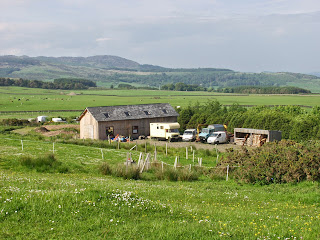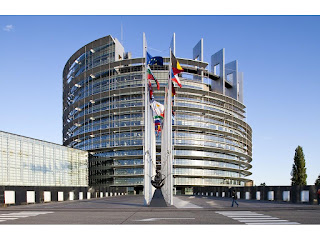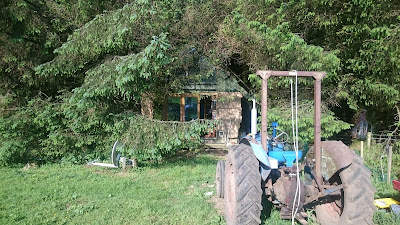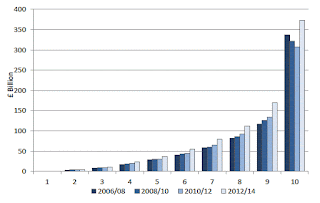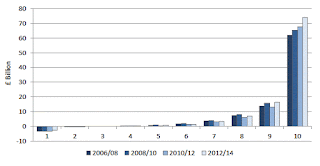 |
The old feed store, with Alice's parrots.
All photographs in this post are from
Standingstone. |
It's no secret that I live at Standingstone. In fact, if you check at Companies House, you'll see that I am the chair of Standingstone Farm Limited. So what is Standingstone?
Standingstone is a conspiracy.
It wasn't set set up to be a model of how you solve the problem of rural depopulation, and, indeed, it doesn't, in itself, serve as a model to solve the problem of rural depopulation. But it serves as a seed from which the shape of a model can be discerned.
Standingstone is a conspiracy of homeless people to house themselves; to house themselves by buying a farm. It isn't - it couldn't be - a conspiracy of just any homeless people. To join the conspiracy, you had to be
- Local to Auchencairn village;
- Unable to afford to buy a house locally;
- Unable to access social housing locally;
- Able to afford the minimum buy-in to the project, which was £30,000, so not trivial;
- Willing to agree the principles of sharing with the rest of the group;
- Unconcerned by the fact that we would not have and were unlikely to get planning permission for the homes we needed.
In other words, you needed to be to some degree a scofflaw, and to have access to at least some capital.
There were some people who were otherwise qualified to join the conspiracy who couldn't reach agreement with the rest of us over sharing; there were some people who we'd really have liked to have here who couldn't raise the buy in price. Those people are not here. That may sound ruthless, but it is what we could pragmatically achieve.
It's consequently a very select group. We were also lucky that left-wing local farmers were prepared not only to offer us the farm, but to wait almost a year while we built and negotiated a group that was able to raise the price (in the end we bought only eighty-eight acres of the one hundred and twenty we were originally offered, because that's all we could afford).
But the number of people normally resident on the farm is about twenty-five, in eight households; and there's a much larger penumbra of people who are associated with the farm, who are often in practice resident. That's an increase of more than 1000% on the two people who lived here before we bought it. It wasn't set up to reverse rural depopulation, but it has the effect of holding people in the area who would otherwise have been forced to leave. And, the farm is home to more than 10% of the children in the local school. In that sense, we're actively reversing depopulation.
We operate as a sort of hybrid between a co-op and a conventional company. Each household that bought in bought a croft (originally eight crofts, now seven). The crofts vary in size between five and twelve acres, depending on how much money was put in. But each croft, regardless of size, regadless of money invested and regardless of how many people live on it, has two votes.
We own most of the woodlands, some of the pasture, and all of the agricultural buildings which were on site at the time we bought the farm, in common.
None of these crofts provides a full household income, although two provide substantially all of the household's food with a surplus to sell. But we none of use depend on our crofts for the whole of our income; we are variously software engineers, artists, musicians, tree surgeons, joiners, nurses, blacksmiths, electricians.
One household occupy the farmhouse; they had enough income to be able to raise a mortgage. The rest of us occupy old caravans, old horseboxes, a yurt and a hut. That's changing. One household has built a magnificent barn, while another household is currently building a real house with real planning permission. Both of these buildings have been built largely with sweat rather than money - the timber for both arrived on site as logs and has been sawn here. But they're both valuable.
This represents something that needs to be learned; a weakness in our model which should not be reproduced. When we negotiated the original settlement, the deal was that the company (that's all of us) had first option to buy any croft that was sold, at a price which more or less represented the purchase price of the croft. If either of these crofts were to be sold, it would be unjust for the company to say 'we can buy this croft for the original purchase price'; but it would be simply impossible for the company to buy the croft at a price which recognised the value of the buildings. If the crofts with these buildings are sold on the open market, it will be impossible for households in housing stress to buy them - they'll be by far too valuable, and consequently they'll sell to people from outside the local economy who have wealth unavailable to people in the local economy. So while we've largely solved the problem of housing stress for us in our generation, ultimately we may just be creating buildings which will become part of the problem.
The problem
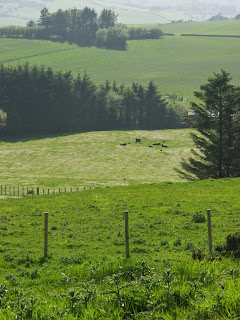 |
| View over the commons |
Many remote rural areas of Scotland, especially in areas of good scenery, are now characterised by house prices which are significantly higher than the local economy will support. This means that people who have jobs in the local economy can't afford housing, and that the housing that is available sucks in people whose wealth and/or income derives from outside the local economy.
While there was at one stage a lot of optimistic prediction that the internet would bring high value work to rural areas, this hasn't really materialised. There are a number of reasons for this; one is that it is and will for the foreseeable future be cheaper to deliver high bandwidth connections in urban areas; and another is that knowledge work generally is teamwork, and teamwork does not really work as well without the constant informal interactions of proximity. This isn't to say that improved digital communications can never bring higher value jobs to rural areas, but they haven't yet.
At the same time the population of rural areas has declined steeply over the past century to the point where population densities are in many places too low to support local services. In my lifetime, Auchencairn had a soutar (cobbler), a bakery, a post office, a pub, three shops, a garage, a school, a church, a police station. Even that was a sharp decline from fifty years previously. Now, one shop, incorporating the post office, remains but its future is uncertain; the garage remains, but its future is also uncertain; the school and church remain. The rest are gone. Part of the problem is the steady increase in holding size and the steady decrease in the number of people actually engaged with the land.
There are also strong factors militating against adding value to produce in the rural economy. The creamery at Kirkcudbright has gone; milk from the Stewartry is now trucked either to Lockerbie or to creameries in the central belt. A few small producers are successfully maintaining local production:
Loch Arthur's cheese production, and
Cream of Galloway's ice-cream and now cheese, are leveraging good produce to provide additional jobs on the farm.
Other businesses in small towns such as
Castle MacLellan Foods and
West Coast Sea Products add value to produce locally and retain jobs in the local economy, but these are neither strictly rural jobs nor are they high value.
Furthermore, a bureaucratic food standards regime makes life extremely hard for small food processing businesses, as the current problems at
Errington's Cheese illustrate. It seems both that Food Standards Scotland are prejudiced against unpasteurised products, and that they greatly prefer large industrial production units which are easier for them to inspect. Following the Errington's debacle, it's going to be extremely hard to raise capital for new small rural food businesses.
Agriculture does generate some high value work, of course. Agriculture uses increasing amounts of capital equipment, which must be developed, designed and manufactured somewhere. In Castle Douglas, Auchencairn's local market town, the milking machine was invented; the first milking machines in the world were designed and developed here. The company which made those first milking machines still exists; I buy plumbing parts, baler twine and tractor accessories there. But it no longer makes anything. The design and manufacture has long since gone to distant factories in distant cities, and none of the wealth generated comes back.
With the lack of high value employment locally, it's inevitable that many of the people buying the housing are past employment age: people retiring from much higher paying urban economies, selling a perhaps modest house or flat in the city to buy a retirement home in a pretty village; or perhaps people in their middle years, using wealth inherited from their parents to buy a good, solid house which will stand empty for ten months of the year.
The holiday home owners are utterly parasitic on the rural economy. Typically they buy their groceries in urban supermarkets; they have their vehicles maintained in urban garages. The only local services they buy are building and garden maintenance, and those sporadically. They contribute nothing to local civic society.
Retired folk are somewhat better. They arrive at about sixty-five; for ten years they energetically involve themselves in local activities, and during that period learn something about the locality. They buy their groceries locally, service their car locally, get their hair cut locally, use health-care services locally. For ten years, they contribute. Then, at around seventy-five they become infirm. Even then they're not entirely parasitic: they're increasingly providing employment for health and care workers - but their care is being paid for out of a local budget to which they did not contribute during their earning years. At around eighty-five they die, and are replaced by a fresh wave of energetic sixty-five year olds arriving from the cities.
But there is one significant problem with retired folk. They want the landscape of their idyll unchanged the way it's always been - by which they mean how it was ten years ago when they first saw it. They're extremely resistant to changes that could bring jobs and wealth into the community, and they're completely unaware of what the local landscape looked like just twenty years before.
You cannot build or maintain a community on the basis of a rolling population of elderly strangers, no matter how talented, well meaning and energetic. Furthermore, a population of elderly incomers provides no children to keep local schools open. Finally, of course, in a community where all the decent housing has been bought up at high prices, there is nowhere locally for the care and health workers needed to service this elderly population to live.
The shape of the solution
 |
| A family with four children under twelve live here |
To achieve a population density to maintain local services, we need to be able to provide desirable homes for people of working age, with children, at a price that work available in the local economy can fund.
Why can't we?
In a capitalist market, the price of a good (in this case shelter) is the price which some person is prepared to pay for it. It doesn't have to be the person who needs the good; thus throughout the Irish potato famine, when a million people in Ireland starved to death,
Ireland was exporting record amounts of food. Similarly in the Ethiopian famine of 1984, Ethiopia was generating foreign exchange by exporting water melons to Europe. It wasn't that food wasn't available; it was that the food which was available wasn't affordable to local people, because wages in the local economy didn't generate enough money. So it is with housing in rural Scotland.
The factors which drive prices up are high demand, limited supply. Supply of rural housing in Scotland is largely limited by planning restrictions, imposed by relatively distant bureaucracies. In some places it's also limited by monopolist landowners, who refuse to release land for housing. High demand is generated by the steady supply of pensioners retiring from successful careers in the cities.
We need to produce housing - good housing, housing which people will aspire to - which is protected from the capitalist market, and reserved for people who work and raise children in the local economy. At the same time it is essential to ensure those people can have a good life. To lead a good life on the restricted income which is available in a remote rural economy, you have to be able to get the best out of living in a rural place. You need to have access to your own ground, where you can grow food to supplement your diet and even your income; you need access to your own woodlot, from which you can extract carbon-neutral fuel from domestic heating.
And you need access to neighbours - to community. To people with whom your can share your joys and celebrations, but also your major work projects; so that raising a house, or gathering in a harvest, can become a communal event, a shared event, a celebration in itself.
Adapting the model
As I've implied above, there are mistakes that I believe we've made in setting up Standingstone, mistakes which will militate against it being a sustainable place for people who earn their incomes in the local economy to live beyond our own generation. Our members will, gradually over time, build legal houses with planning permission, and those houses will represent sufficient wealth that, should they or their heirs choose to sell, the rest of us will be unable to afford to buy the croft in, and anyone buying on the open market will not be the sort of people we wanted this place to be.
So to take us uncritically as a model of how to build new rural communities does not work. But relatively little change would be needed to make the model sustainable.
Rural Housing Burden
I see two ways forward. The first would be to make all houses we build subject to the
Rural Housing Burden. The Rural Housing Burden is a truly estimable scheme introduced by the Scottish Government, the terms of which are as follows
"The purpose of the Rural Housing Burden title is to maintain affordability on a property in the event of future sales. The plot the title is placed on has usually been acquired at well below the market value and the title ensures that the discount is included in the future sale price. The community have 42 days in which to accept the offer.
"If the burden is not exercised, it will lie dormant until the next sale, so it remains in the title in perpetuity."
We could have made all houses we built subject to the Rural Housing Burden. We discussed it, but we didn't agree to it. I think this was a mistake. However, a future community could make this part of their ground rules.
Liferent
The alternative is that instead of selling crofts to its members, a future community would let liferents on crofts. A
liferent is a traditional Scottish form of land tenure in which someone is given the usufruct of a piece of land for their lifetime. When the tenant died, the land would return to the landowner, which in this case would be the community. To adapt the liferent model to our needs now, the liferent would probably need to be given to a cohabiting household on an 'either or survivor' basis, so that if a member died, their surviving partner would still have security of tenure to the end of their life.
Of course, in modern conditions, cohabiting households do not necessarily cohabit for life. When cohabiting relationships break down, there would need to be some form of negotiation over who would continue the tenancy, but that is outside the scope of this essay.
The liferent model means, of course, that households can't build homes on their land as heritable property, and consequently probably can't get a mortgage to build a home. But the community, to which the land will return at the end of the liferent, could borrow long term against the security of the property, to finance building.
I'm promoting the liferent model rather than an ownership model because inheritance is the primary engine which drives social inequity. If we create heritable crofts, they too will ultimately become valuable and will confer unearned privilege on the children of crofters.
The liferent model doesn't, of course, mean that the former tenants children can't take over the tenancy after the death of their parents; it only means that the community as a whole gets to choose who the next tenant will be. Of course the children of the previous tenants could, if they wanted, be candidates. It's probable that many communities might have a presumption that children would take over their parents' croft. The only principle I'm trying to defend here is that it should not be automatic, should not be a right. I'd emphasise the liferent model especially if any degree of public money has gone into the intitial acquisition of land; crofters really shouldn't be able to profiteer on the back of public subsidy.
A liferent might entail a one off payment to the community at the start of the tenancy, or might entail an annual payment; that is I think a matter for the individual community.
Residency condition
Living in a rural economy is precarious. A croft does not, and will not, in itself provide a family income. Crofters and small farmers from across Scotland have had to work away from their land throughout history, to earn cash income; as mercenaries, as herring fishers, as whalers, as oil workers. I often have to work away as a software engineer. It isn't reasonable to place a condition on a crofting tenancy that the tenant must be permanently resident. At the same time it's clearly an abuse if you hold a tenancy but in practice use the croft as a holiday home, sublet it to someone else, or leave it vacant.
I think that after some period of non-residency - I would suggest five years - the community should be able to terminate the tenancy. That doesn't mean that the tenancy would automatically terminate, just that there would be a right for the community to terminate it, which would be a means of forcing the tenant to start a dialogue with the rest of the community about what they intended.
Obviously, it should also be possible for a tenant to voluntarily give up a tenancy.
The importance of commons
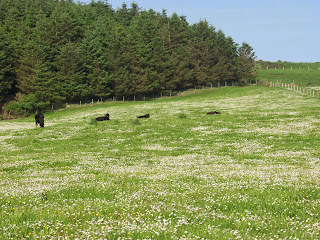 |
| My cattle in Commons Meadow |
When we set up Standingstone, our original view was that all the existing agricultural buildings, all the woods and part of the pasture should be common. It didn't work out like that; two crofts (including mine) ended up with small parcels of woodland. But the buildings, the largest wood, the access roads and one field have ended up as common and I think that has positive value. Common assets and common responsibilities provide something concrete to bind the community together; having common pasture means that there is a buffer of reserve grazing for when individual crofters have more beasts than their own grazing can carry, without dedicating that grazing to a particular croft permanently. We also, of course, have to discuss who will have use of it when.
One thing we don't currently have, and would undoubtedly benefit from, is the equivalent of a village hall - a communal meeting and events space, although to some extent The Void, our former high-slat cattle shed which we use as communal industrial space and store, could fulfill this function. The Void is a very significant communal asset; all the buildings we've built so far have been partially prefabricated in it, our tractors and vans are maintained in it, and each croft has a substantial area of storage in it.
Roughly 25% of all our land is common; I think that's a minimum. Three of our crofts are five acre, one (the most productive) seven acre, two ten acre and one twelve acre. I think that a five acre croft is pretty much a minimum; it will with work largely feed a family but it won't create a great deal of surplus.
Financing this
Land is cheaper when bought in larger parcels. A five hundred acre farm of good grazing/reasonable arable land is currently for sale locally for offers over a million pounds, which is to say about £2000 per acre. Such a farm would support about fifty households on five acre crofts with two hundred and fifty acres of common (or rather larger crofts with rather less common, for example seven and a half acre crofts with one hundred and twenty five acres of common). A single community of fifty households may be too big to work smoothly and it might be better to split a five hundred acre block into two communities each of twenty five households, but that's a detail.
The point is, the buy in price of a community on land at this price is twenty thousand pounds per croft. Twenty thousand pounds is less than the average annual wage in Galloway, and is thus not an impossible amount for many households to raise. So it's possible - with appropriate changes to planning law - to set up communities without public money.
However, that would buy just the land. At Standingstone, the planning authorities have in effect turned a blind eye to the fact that at present almost all of us are living ilegally, in structures which do not have and would not get planning permission. Most of us aspire to build legal housing, but speaking for myself it's unlikely that I will be able to afford to do so in my lifetime.
It's reasonable that the planning authorities should turn a blind eye, since they know that more than 5% of the adults normally resident in this parish live in illegal structures anyway, and we represent an attempt in the to long term address that problem. We also provide 10% of the children in the school. There's also a probable benefit to the authorities in that Standingstone concentrates most of the hippies and scofflaws of the parish into one place. But the most important factor in our favour is that, as long term local people, we have the support of the village and of our community council.
For privately financed communities to work, there needs to be some derrogation from planning law, either by formalising the 'blind eye' or by allowing a time window for legal structures to be built; there also, obviously, needs to be a presumption that planning consent will be given for a dwelling on a croft. However I think that such planning permission should be conditional on the Rural Housing Burden applying to any dwelling constructed.
The public interest in repopulating remote rural areas
We live in an economy which is governed primarily by and for urban areas. In this economy, remote rural areas are increasingly stressed. It actually does not serve the urban economy if remote rural areas become extensive ranches producing low-value commodity foods, interspersed by picturesque villages inhabited entirely by geriatrics. The rural areas then become a complex cost for the urban economy to bear. It's to the public good to have a self-sustaining population in remote rural areas.
What changes to public policy would be needed to support the creation of 'Standingstone model' crofting communities?
Changes to planning law
Two key changes are needed to planning law. The first is needed anyway, the second is desirable anyway but needed if no public money is to be made available to support the model.
Presumed consent to construct dwellings
 |
| Interior of one of the buildings we've built |
The first change is that there should be a presumption that consent will be given for a dwelling adequate to house a family to be constructed on each croft, and that that dwelling should be subject to the Rural Housing Burden. That's vital. If people can't legally construct dwellings in which they can then legally live, then the scheme is one which only scofflaws like ourselves will be able to take up.
Planning departments must also not put too onerous conditions on houses to be built. My neighbours James and Vicky, the first of us to get planning permission to construct a legal dwelling, had to spend ten thousand pounds on architects and engineers fees to satisfy the planning and building control authorities. That's more than a third of the total I estimate I could raise to build myself a more permanent dwelling, and is the primary reason I'm deterred from even attempting it.
Partially this problem could be addressed with an 'open source' library of pre-approved house plans, which I'll discuss in more detail later.
Derrogation for temporary dwellings
 |
| My (entirely illegal) house. |
If poor people spend all the money they can raise to buy land, they are unlikely to have money available to build dwellings immediately afterwards. If they were to be able to raise money to build in the mainstream mortgage market, then neither liferent nor Rural Housing Burden would be viable. Therefore, unless there is public money available, legal dwellings cannot be built quickly. Even with access to public money available, it's going to take some time for legal dwellings to be built. And in the meantime, the crofters need somewhere to live while they develop their crofts and build their legal dwellings.
In brief, the law of the land is that you can't live in temporary structures except temporarily, but you can live in a temporary structure while you're building yourself a dwelling for which you already have planning permission. Given that there must be a presumed consent to construct one dwelling on each croft, it doesn't seem unreasonable that there should be toleration for one household to live in temporary structures on each croft until that dwelling is built. There might be a time limit on this - perhaps ten years - but there needs to be some flexibility.
Changes to community right to buy
The community right to buy is a scheme which provides some public money for communities to buy land or fixed assets subject to some conditions. One of the conditions is that the 'community' is a pre-existing community of place: the people who already live in an existing settlement. This is more or less meaningless when the 'communities' are composed primarily of the non-native elderly. The non-native elderly don't have a long-term investment in an area, and won't be around to see longer term schemes coming to fruition. And, of course, in the most devastated areas of remote rural Scotland, there are no existing communities of place; the landscape is largely or wholly unpeopled.
Also, for new communities to work, they need to be communities of people who can agree ground rules by which they will live and work together. Such people will not necessarily all come from the same settlement or even from the same area. They will be new, intentional communities. New intentional communities do not currently qualify to access public money under the community right to buy.
I'm not suggesting that new intentional communities should be able to exercise the pre-emptive parts of current or future community right to buy legislation; they should be able to apply for public money only to buy land which is already on the market. The public money would not necessarily have to be a grant; it could be in whole or in part a long term low interest loan, because it is not unreasonable to require some financial contribution from crofters proportional to their earning power in the remote rural economy.
Such public money would have to be on the condition that all houses built on the land acquired should be subject to the Rural Housing Burden - otherwise this just becomes a new way for people to profiteer from speculative building.
I'd also like to see a scheme under which 'Standingstone model' communities, once they'd acquired their land, could borrow for finance to construct dwellings, and could do so on the basis that the labour would be provided by the community itself. This would not need to be public money, it's entirely possible that the financial services industry could lend given appropriate guarantees; but there would have to be some degree of legislative support for such a scheme, and some degree of public guarantee would also be welcome, since if private lenders could repossess crofts and sell them on the open market we'd be back to having a backdoor mechanism for building speculative retirement homes.








